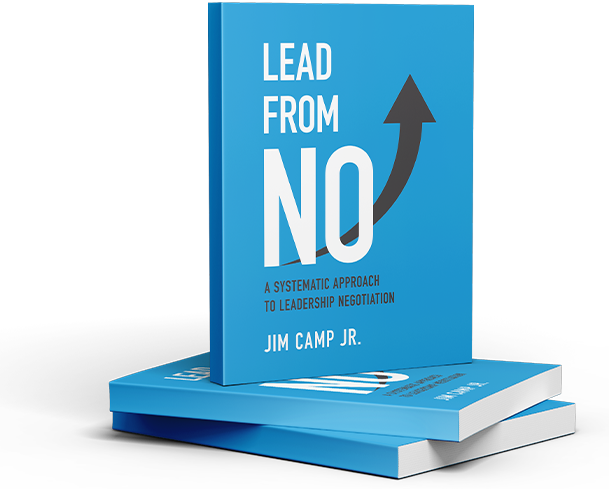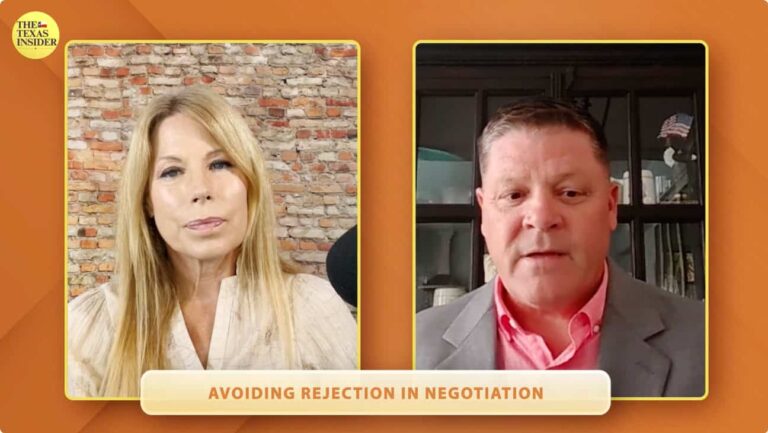When people are afraid or hesitate in negotiations, it all boils down to two fears of negotiation. This is Part 3 of the transcript from Dave DeSantis’ webinar for GreenWave Commissions CEO Slava Isayev. (If you missed Part 2, listen here.)
[00:00:00] Dave: This leads us to the two fears of negotiation and this is what really stops people. Whether they admit it to themselves or not, we have a fear of saying no. The reason we don’t like to say no is because we don’t want to damage your relationship. Somebody asks you for something, right? If you say no, “Oh no, they’re not going to like me. And if they don’t like me, I won’t get this deal. Then if I don’t get this deal, I won’t get the next deal. And if I don’t get the next deal, I’ll get fired and blah, blah, blah.” The whole end of the world is going to happen. But you know what? Don’t feel bad. It’s part of the way our brain works.
[00:00:48] Dave: Okay? As a species of animals on this planet, we’re not the biggest. We’re not the strongest. The way we get along and the way we are able to put our influence over the planet is because of our ability to work together. So, we have this hard drive to be social with one another and to work together. And so, our brains allow us or force us to override that need to be social, that need to be with others, not to piss them off. Not to say no to, okay?
[00:01:21] Dave: But what we’ve done is we’ve convoluted this thing. We’re well past the need for survival. We’re just talking about an insurance deal. It’s not the end of the world if it happens or it doesn’t happen, versus, yes, if I don’t stay in the pack, the lions are going to eat me. That’s a little bit different, a little more severe. Yet our brain can’t tell the difference.
[00:01:41] Dave: So, we have this natural fear of saying no to people, but to know where it comes from is the first step in being able to deal with it.
[00:01:50] Dave:The second thing about no is we don’t want to say it. We don’t like to hear it. Think about what are the first words when you’re a little kid; you learn, right? Your parents are talking to you, and it’s no, okay, that’s what you’re saying back to them. And what are you doing? You have some autonomy for the first time in your life: you’re saying no. As you get a little bit older, though, that shifts because you knew that your parents would always take care of you, so saying no to them was no big deal. But as you get a little older and you think, “No, now you think, hey, this person doesn’t have to take care of me.”
[00:02:23] Dave: If I tell them no, they’re going to run away, and I’m back to the same old story. Okay? So, if I tell them no, they’re going to run away.
[00:02:30] Dave: If I hear a no from them, I’m offering them something. I’m inviting them to something, and they say no to me, I feel personally rejected. Okay? When the truth is it’s nothing about me, it’s just about whatever that offer was they didn’t like.
[00:02:46] Dave: So that’s the next level of awareness for you. So, we got three myths. Compromise is required. Power and leverage are required, and no is a bad decision. Those are myths, and they’re all based on two fears, the fear of saying no and the fear of hearing no. So, if you think about that, just spin around in your head a little bit, and think of yourself when you’re in negotiations.
[00:03:09] Dave: And again, we think of negotiations: either we’re asking for decisions, or we’re communicating decisions that we’ve made to others. All right, so if we say, if we’re in the asking for decision business, what kind of decisions are they going to give us? A positive response or a negative response? We have to learn how to deal with it when we get a negative response. We can’t let that primal sense in us drive, “Oh no, the world has ended.” Okay. What we found is when people give you a negative response, it’s usually for one of four reasons. And if you know those reasons and you know how to deal with those reasons, all of a sudden, no isn’t such a bad thing.
[00:03:52] Slava Isayev: I got to say, Dave, that as I was learning those concepts, to begin with, it was just amazing and, uh, changing how your mind thinks about things and that there is actually a little trick to that as long as you put yourself into the mindset that no is not a bad thing. I just got to rethink it. And you do it within a second and a half, which is the time to engage, fight or flight response in your brain.
[00:04:16] Slava Isayev: If within the first second and a half, you tell yourself, no is not a bad thing. Then suddenly you start thinking they’re just telling you something very important, versus if they said yes and then maybe do nothing? In the end, when they say no, they clearly define where the boundary is, whatever that boundary might be, and it’s a wonderful thing.
[00:04:38] Slava Isayev: So eventually, after doing it 30, 40, 50 times, your brain starts saying, “Oh, okay. No, it’s not such a bad thing.” It actually tells me a whole lot. It’s an intelligence-gathering tool, if anything.
[00:04:51] Dave: Yes, that’s great insight, Slava. Thanks. And if you hear the no’s, now you know what the limit is. Now you figure out, okay, I can’t go that far or understand a little bit more about that limit.
[00:05:01] Dave: If they tell you yes, you don’t know where the limit is. And then you’re back to offering your thing for $45 instead of the hundred that you could’ve,
[00:05:10] Slava Isayev: Or worse, you are offering it for the higher price, thinking that they’re agreeing with you, and then it eventually spends time on both sides and dwindles away.
[00:05:19] Dave: And nothing happens.
[00:05:20] Slava Isayev: And worse, I think.
[00:05:21] Dave: Because in both instances, you didn’t get a hard decision. Because decisions are what make negotiations move forward. Our motto is, we don’t care if you say yes or say no, but you have to say it, and that’s the case. So, we say, what are the three real decisions that people typically make?
[00:05:36] Dave: It’s either a yes, a no, or a maybe. And a maybe is the worst because it’s not a decision. So, if you take anything away here, treat your maybes, whenever you get a maybe, as a no and handle it the same way you would a no. That’ll help you drive toward some hard decisions.
Summary: The Two Fears of Negotiation
- Fear of saying no
- Fear of hearing no
Which is hardest for you to overcome?
Look for our next video, when Dave discusses a way to negotiate commissions with new employees.





